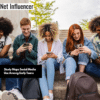-
Platform
TikTok is set to sponsor a Trump inauguration celebration on January 19 in spite of ban
January 17, 2025TikTok is set to sponsor a $50,000 inauguration celebration on January 19, honoring social media influencers...
-
Commentary
Study Reveals The #1 Factor Driving Podcast Listeners Back For More Episodes
January 17, 2025New research from Signal Hill Insights reveals that entertainment value is the most critical factor in...
-
Platform
RedNote Welcomes ‘TikTok Refugees’ As U.S. Ban Nears
January 17, 2025More than 500,000 American users have reportedly joined RedNote, according to Reuters. This as TikTok grapples...
-
Platform
Snap’s Creator-Driven Campaign Eyes TikTok Exodus Opportunities
January 17, 2025Snap Inc. has launched a new creator-focused campaign across U.S. digital platforms. Dubbed “Find Your Favorites...
-
Commentary
Traackr Names 2024 Top Beauty And Fashion Creators
January 16, 2025Traackr has released its 2024 beauty and fashion industry report, highlighting top creators across makeup, skincare,...
-
Platform
Instagram Challenger Pixelfed Sees Record Traffic After Meta’s Content Moderation Retreat
January 16, 2025Pixelfed, a decentralized photo-sharing platform, has experienced a significant surge in traffic following Meta’s recent changes...
-
Brand
Delta Boosts In-Flight Entertainment, Partners With YouTube
January 16, 2025Delta Air Lines is partnering with YouTube to offer ad-free content through its in-flight entertainment system,...
-
Agency
Havas’ New Creator-Led Docuseries ‘Shape Shifting’ Explores The Food Industry Impact Of GLP-1s
January 16, 2025Havas has launched a new docuseries examining how GLP-1 medications are impacting consumer behavior and reshaping...
-
Platform
Substack New Live Video Feature To Boost Creators’ Connection With Audiences
January 16, 2025Substack has expanded its live video feature, making it available to all publishers. Previously, this feature...
-
Platform
TikTok Assures U.S. Employees Jobs Are Secure Despite Possible Ban
January 16, 2025TikTok assures its U.S. employees they will retain their jobs and benefits even if the Supreme...
-
Influencer
MrBeast Eyes TikTok Takeover, Claims Support From Billionaire Backers
January 16, 2025YouTube creator Jimmy “MrBeast” Donaldson claims multiple billionaire investors have approached him about joining a potential...
-
Influencer
YouTube Sensation ‘Ms. Rachel’ Is Bringing Viral Edutainment Show To Netflix
January 16, 2025Netflix partnered with educational content creator Rachel Accurso, known as Ms. Rachel, to bring her research-backed...
-
Agency
Local Creator Marketing: How Hummingbirds Connects Brands With Community Voices
January 16, 2025Emily Steele is making strides in local marketing through Hummingbirds, a venture-backed SaaS platform that connects...
-
Agency
How Charles Haynes Built Ziggurat XYZ Into YouTube’s Premier Agency For Expert Creators
January 16, 2025With social media platforms providing fertile ground for entertainment content to flourish, Charles Haynes identified an...
-
Commentary
YouTube Spotlights Top Trends, Creators And More In 2024
January 15, 2025YouTube’s 2024 Global Culture & Trends Report highlights the rise of digital franchises as pivotal players...
-
Commentary
1 Billion Followers Summit 2025 Recap
January 15, 2025The 1 Billion Followers Summit ended recently in Dubai, gathering more than 15,000 content creators, 420...
-
Commentary
Study Maps Social Media Use Among Early Teens
January 15, 2025A comprehensive new study of more than 10,000 U.S. adolescents sheds light on the widespread social...
-
Platform
‘Pure Fiction’: TikTok Denies Viral Elon Musk Buyout Rumors
January 15, 2025TikTok has dismissed rumors of Elon Musk acquiring the platform as baseless, labeling the claims “pure...
-
Commentary
Traackr Study Reveals Social Media’s Top 25 Beauty Brands In 2024
January 15, 2025New research from Traackr unveils transformative trends in beauty brand influence on social media in 2024....
-
Agency
Former Google And HBO Max Strategist Joins Pixly To Expand Agency’s Consumer Brand And Influencer Practice
January 15, 2025Pixly, a leading influencer marketing agency within the Acceleration Community of Companies, has appointed Kayla Fortin...
-
Influencer
Professional Dancer Turned Creator Tamara Bustos Finds Digital Spotlight
January 15, 2025As smartphones and social media transform entertainment, UK-based performer Tamara Bustos discovered an unexpected second act...
-
Platform
U.S. Apple App Store Sees Rise Of Alternative Chinese Social Platform, Amid Looming TikTok Ban
January 14, 2025RedNote, a Chinese app known locally as Xiaohongshu, has risen to the top of the U.S....
-
Technology
Streamlabs, NVIDIA, Inworld AI Unveil Intelligent Streaming Tool To Boost Creators’ Production Capabilities
January 14, 2025Streamlabs, in partnership with NVIDIA and Inworld AI, announced an intelligent streaming assistant that combines co-hosting,...
-
Strategy
Brat TV Acquires Electric Monster To Expand YouTube Reach
January 14, 2025Digital entertainment studio Brat TV has acquired Electric Monster and rebranded as ZATV, aiming to broaden...
-
Platform
Meta To End Majority Of Diversity And Inclusion Programs Amid Corporate, Legal Shifts
January 14, 2025Meta announced through a memo that it is terminating a majority of its diversity, equity, and...
Connect with us






















































